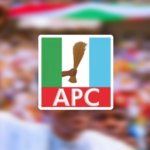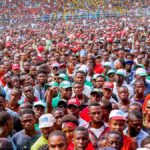It’s common knowledge that Nigeria’s two leading political parties aren’t firmly rooted in any known political ideology.
As aspirants campaign to be party flag-bearers for various political offices in the 2023 elections, despite the fact that many of them would reveal their unfitness for political office if forced to articulate political and socio-economic theories, top party officials appear unconcerned about their antecedents or ideological affiliations.
Buhari’s supporters endorse Kwankwaso
14m votes waiting for Tinubu in S/West – SWAGA
The outrageous fees charged for nomination forms signals quite clearly that they are far more concerned with deep pockets than deep thoughts!
Nigeria professes to practice “American style democracy”, but this isn’t true. In America, an aspirant’s ideology and philosophy are of primary consideration in the selection process, whereas in Nigeria the primary consideration is ability to garner humongous amounts of money! In most American states the cost of participating in primaries is $5,000 for governor or senate, $2,500 for the house of reps, $1,000 for state senate, $500 for state house and $100 for county-wide (local government).
In the US State of Texas the GDP is $20 trillion, budgets $261 billion and presidential aspirant filing fee $5,000 (N3 million). By contrast Nigeria’s finances are relatively small with a GDP of $446 billion and budget of $23.3 billion (less than one tenth), yet presidential filing fee is approximately $166,000 (N100 million)! By comparison Nigerian governorship forms are quite ludicrously 16 times more expensive and presidential forms 34 times more expensive! By means of such subterfuge, the “political class” restricts itself to only those who have previously benefitted from political office or government patronage and can afford to gamble outlandish funds.
The recovery of campaign expenses with “suitable interest” explains why many elected officials are complicit in ruining the economy by treasury looting through “approved” misappropriation, and engaging in outright corrupt practices. With respect to the highest office in the land, the official basic salary of the President is N1,171,568 per month or N14,058,816 annually. This amounts to N56,235,264 over a four year term. Quite absurdly the cost of the All Progressives Congress (APC) presidential expression of interest and nomination forms is N100 million approximately double the president’s approved four year basic salary! Of course elected presidents enjoy stupendous allowances, but these are not part of take home pay. In as much as presidents are constitutionally barred from taking on other work or engaging in business during their tenure, it stands to reason that aspirants purchasing forms must either be philanthropists who want to “dash” Nigeria N44 million, or investors who intend to recoup election expenses by other means!
The Nigerian political class continues to exhibit a deficiency of morals and ethics which alienates them from the primary purpose of good governance, makes them worship money and renders them incapable of selfless service. It is trite that where politics thrives without ideology, poverty, distrust and disillusionment also thrive. These days, Nigerian politics tends to benefit only those who participate in it, while the rest of us are left to cope with the ill-effects of official incompetence, dishonesty and deceit. Even as the nation resorts to endless borrowing to survive, a large chunk of the unjustifiable proportion of the nation’s wealth appropriated by the political class will be squandered during the elections.
Fortunately some elders and eminent personalities like Chief Afe Babalola SAN have warned that campaigning and conducting elections will cost the nation so much with so little hope of solving any fundamental issue plaguing the nation. Unfortunately, Babalola is urging the suspension of the 2023 elections and setting up of an interim government. Such ideas must be dismissed out of hand. Nigeria operates a constitutional democracy, and there is no provision for operating it only in part by allowing elected legislators to “appoint” an unelected executive! In addition the electorate has as little faith in the legislature as they do the executive. The National Assembly has been repeatedly accused of corrupt practices by anti-graft agencies and is replete with former high office holders who led the nation to ruin, never served meritoriously, and who under normal circumstances should no longer be participating in public office or any government affairs.
Any attempt by the National Assembly to set aside the constitution and install an unelected “interim government” would be ill-advised and most likely exacerbate problems rather than solving them. Also there is scant evidence that the National Assembly is interested in the tenets of good governance. They continue to exemplify mediocrity and thoughtlessness by repeatedly approving loans with no plan as to how to repay, and enacting bills establishing more educational institutions despite the nation being close to bankruptcy, and the educational sector remaining in perennial crisis of underfunding. The funding crisis in the education sector is exacerbated by legislators turning establishment of tertiary institutions into political projects. A major criticism of the National Assembly is that legislators prioritise oversight functions and constituency project execution over and above actual lawmaking. Indeed most legislators campaigning for re-election advertise projects they facilitated in their community, rather than any enacted laws they supported or authored which enhances citizens’ welfare or enforces their rights.
Politics in Nigeria is sliding towards being a fully fledged business enterprise reserved for the super rich. Tragically for the nation those who possess the deep pockets necessary to successfully contest elections, may not be those who possess the deep thoughts necessary to turn the nation’s fortunes around.

 Join Daily Trust WhatsApp Community For Quick Access To News and Happenings Around You.
Join Daily Trust WhatsApp Community For Quick Access To News and Happenings Around You.

